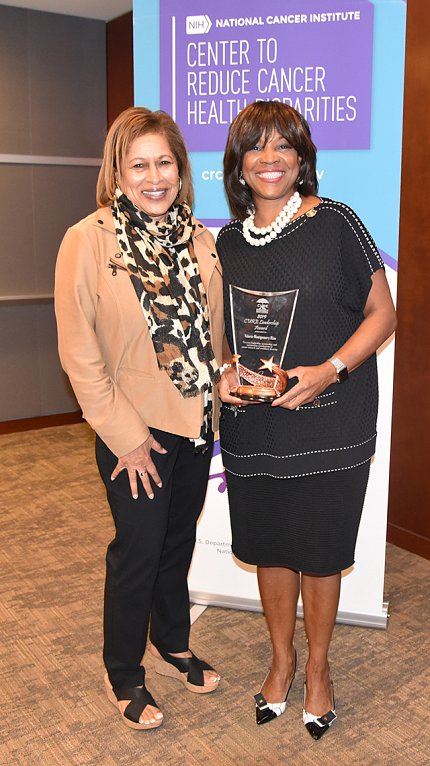Montgomery Rice Addresses Workforce Diversity, Culturally Competent Care

“Giving people what they need, when they need it, in the amount they need to reach their optimal level of health.”
That is how you achieve cancer health equity, said Morehouse School of Medicine president and dean Dr. Valerie Montgomery Rice during a recent talk in the Continuing Umbrella of Research Experiences (CURE) Distinguished Scholars Seminars. In her presentation “Advancing Cancer Health Equity: Understanding the ‘Why’ and ‘What’ Is Needed to Transform the Landscape,” Montgomery Rice focused on increasing workforce diversity and the importance of culturally competent care, often assessing these issues in the medical school context.
The seminars recognize outstanding former CURE scholars and are sponsored by NCI’s Center to Reduce Cancer Health Disparities (CRCHD). A widely respected infertility specialist and researcher, Montgomery Rice was one of the first recipients of a CURE diversity supplement. Her program director at the time was now-CRCHD director Dr. Sanya Springfield, a long-time mentor of hers.
“The most important thing we need to do is diversify the health care workforce,” said Montgomery Rice, who is committed to expanding and developing the next generation of underrepresented minority (URM) physicians.
She said URM medical school applications and acceptances have “flatlined,” with a decreasing number of black men pursuing medical school. The gap between black female and male applicants to medical school was wider in 2017-2018 than at any point in the past nearly 40 years. In 2018, 257 black males attended medical school out of more than 21,000 medical students.
“We have a responsibility to recruit, educate and train because we know that gender diversity and representation matter. We know that racial and ethnic diversity matters,” said Montgomery Rice.
Interventions should begin in third grade to encourage the next generation to consider science and medicine, she added. For 5 years, Morehouse School of Medicine (MSM) has adopted the Tuskegee Airmen Global Academy, a K-5 school in Atlanta composed of 600 students—98 percent of whom are on free lunch. The entire student body visits MSM 4 times a year, and more than 125 MSM employees are certified to visit the school to teach important lessons, such as getting students excited about science.
“Sometimes you’ve got to see something to believe it’s possible, so they get to see us—our doctors, medical students, our researchers,” Montgomery Rice said.
She stressed the necessity of practicing culturally competent research and health care, which requires that health care professionals understand their own cultural beliefs, learn and accept those of the health care consumer, recognize the differences between the two and acquire a basic understanding of the consumer’s environment.
“Disease always occurs within a context of human circumstances,” said Montgomery Rice, noting factors such as social position, economic status, culture and environment.
When she conducted research on ovarian cancer in mice, she kept a photograph of an ovarian cancer patient on her desk to remind her of who would ultimately benefit from her work. She also sought out and got to know the patients whose cells she analyzed, to provide herself with helpful context.
“Whether you’re working in a lab or helping a patient make a clinical decision, you have to ask that question—‘Based on who’s sitting in front of me, what’s possible?’” Montgomery Rice said.
In conclusion, she credited audience members for their role in “delivering the promise of science,” which “makes miracles every day.
“Make sure that promise is not limited. The promises of hope are not limited based on somebody’s gender, their identity, their race, their ethnicity, their orientation, [or] where they live.”
